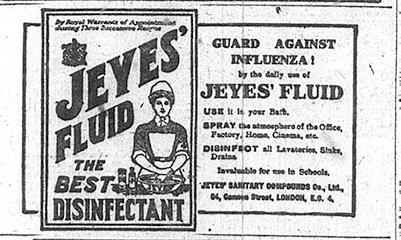It is a moment in history that is often overshadowed, coming at the end of four years of warfare.

But a special event involving experts from the University of Worcester will shed new light on the devastating effect of the Spanish Flu pandemic in Worcestershire and beyond.
The study day, which is open to the public, will detail the science, facts and figures of what happened, but also the human stories behind it.
“I think that people do not seem to be aware of how devastating the flu pandemic was,” said the University’s Professor of Cultural History, Maggie Andrews. “It tends to be overshadowed by the First World War or subsumed into the idea of death and destruction of this war. Yet, across the world as a whole, flu killed many more people – estimates suggest approximately 50 million worldwide. Approximately 840,000 British soldiers were killed in the four years of war, yet in just over one year the Spanish Flu killed approximately a quarter of a million people in Britain.”
The study day, titled Bovril, whisky and gravediggers: The Spanish Flu Pandemic comes to the West Midlands 1918-1920, is at the George Marshall Medical Museum, in Worcester, on Friday, April 5, from 10.45am-2.30pm. It is a partnership event between the University of Worcester and History West Midlands, which have been working together to research the local history.
Historians and scientists from Worcester and London universities will explore the history of the flu at a national and local level, and the science behind such pandemics. There will also be a panel discussion, question and answer session and contemporary film footage.
The Spanish Flu pandemic took hold in 1918 and devastated many families.
“Because of the age group that died of flu - young adults - many families who had already lost sons or husbands in the war were also affected by flu,” said Professor Andrews. “Families who had lost sons in the war lost daughters at home to flu. Men waiting to be demobbed after the Armistice died of the flu or came home to discover their wives or children had died of the flu.”
One tragic case involved Mrs Bertha Cowley, of Fladbury in Worcestershire, who lost her youngest daughter Florence having already lost Florence’s twin brother Arthur on active service in France the previous year. “According to the local newspaper at Florence’s funeral ‘the grave was completely hidden from view by flowers’,” said Professor Andrews
Her research shows the problem was further compounded in the West Midlands by a lack of resources to care for people suffering with flu, with doctors and nurses still away at the front.
“There were overworked doctors, queues at pharmacies, a shortage of comics in Worcester as they have all been bought up to keep young patients amused and schools were closed,” said Professor Andrews. “In Birmingham the undertakers struggled to cope with demands for their services. Dead bodies lay in rooms waiting for burial as there was a shortage of gravediggers in Coventry and Birmingham, with so many of the fit young men who undertook such roles in the army.”
School groups are welcome to attend. For more detail or to book tickets visit Eventbrite.
Find out more about studying History BA (Hons) at Worcester.